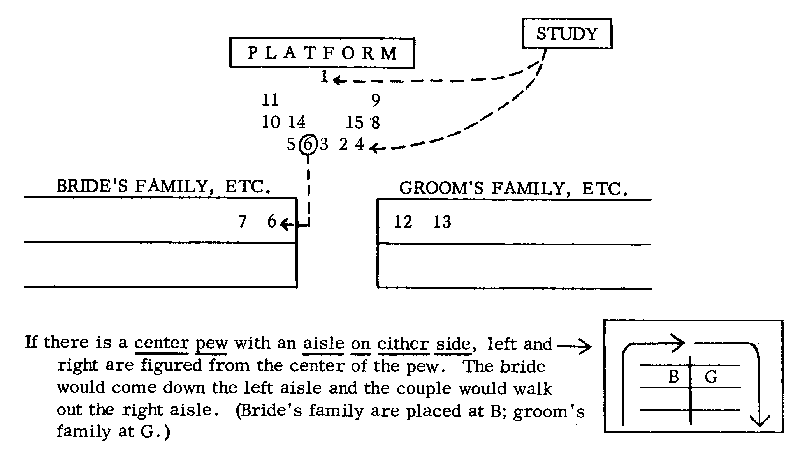
|
Understanding The Bible |
Return to Syllabus
Dr. Clarence E. Mason, Jr.
Philadelphia College of Bible
1966
Denominational Distinctions
Di 425
PASTORAL STUDIES
(in connection with Di 435 Denominational Distinctions)

APPENDIX
(cp. VIII. The Pastor and Weddings, p. 9)
(furnished at request of class)
A PROTESTANT ANSWER TO THE FAMED CATHOLIC PRE-NUPTIAL CONTRACT
I, the undersigned, not a member of a Protestant Church, wishing to contract a marriage with a Protestant person whose signature is also affixed to this mutual agreement, being of sound mind and perfectly free, and only after understanding the import of my action, do hereby enter into tills mutual agreement, and the promises therein contained are made in contemplation of and in consideration for the consent, marriage, and consequent change of status of the hereafter mentioned Protestant partner, and I hereby agree:(1) That I will not interfere in the least with the free exercise of my Protestant partner's religious conviction and practice;
(2) That I will adhere to the doctrine of the sacred indissolubility of the marriage bond, so that I cannot contract a second marriage while my consort is alive, even though a civil divorce may be obtained, except I have that right to divorce and subsequent remarriage permitted by the Lord Christ on the basis of moral infidelity (adultery) on the part of my consort (Matthew 19:3-9; 1 Corinthians 7:39);
(3) That any and all children that may be born of this union between myself and the partner undersigned shall not be baptized in the faith of the Roman Catholic Church in infancy or at any time during the period of life before they reach maturity and make their own choices, even in event of the death of my Protestant partner. In case of any dispute which might, nevertheless, arise between us or between me and my wife's duly appointed guardians, I shall not hinder her or them in the faithful execution of her will and desire that the children be brought up in the Protestant faith;
(4) That I will lead a married life in conformity to the Bible's teaching of holiness and purity;
(5) That no other marriage ceremony shall take place before or after this ceremony in which a Catholic priest participates or has any part;
(6) That my wife will not only be free in the exercise of her desire to follow Christ in a Protestant Church, but that I will do her the courtesy and exercise the intellectual honesty of examining the grounds for the Protestant faith, from time to time attending a Protestant service with her;
(7) That the religious training of all children shall be of a Protestant nature and never of a Roman Catholic nature.
In testimony of which agreement, I do hereby solemnly swear that I will observe the above agreement and faithfully execute the promises contained therein, and do now affix my signature. _________________ Attested _________________ Catholic partner Protestant partner.
Return to Syllabus
 "Mason's
Notes"
"Mason's
Notes"
 200 Manor Avenue Langhorne, PA 19047 United States of America |
"Mason's Notes" Study materials on this website are made available here free, through the generosity of Cairn University, and may be copied for use in Bible study groups, in limited numbers, providing that no charge is made for them. No further distribution or use of these materials is allowable under U.S. or International Copyright Law without the express permission of Cairn University. |
20160408